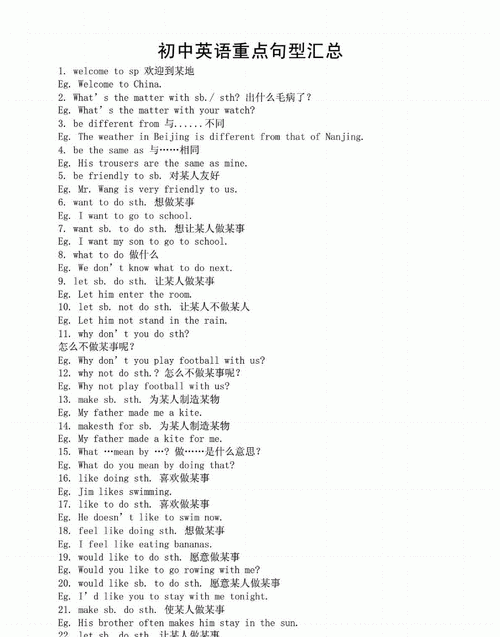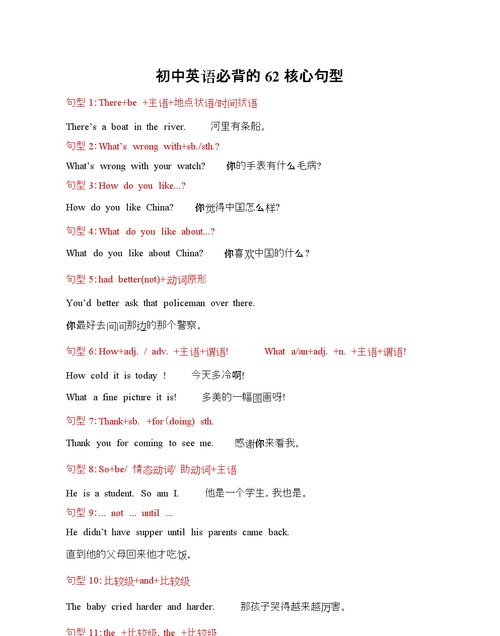本文目录
英语中常见的基本句型有几种
基础英语最常见的句型100句
学习基础英语需要了解一些常用的句型!下面是关于基础英语最常见的句型100句,欢迎阅读了解!

1. want to do sth 想做某事
I want to go to school.
我想去上学。
2. want sb to do sth 想让某人做某事
I want my son to go to school.
我想让我的儿子去上学。
3. be different from 与......不同
The weather in Beijing is different from that of Nanjing.
北京的天气和南京的不同。
4. be the same as 与……相同
His trousers are the same as mine.
他的裤子和我的一样。
5. be friendly to sb 对某人友好
Mr. Wang is very friendly to us.
王先生对我们非常友好。
6. welcome to sp 欢迎来到某地
Welcome to China.
欢迎来到中国。
7. What’s the matter with sb/sth? 某人/某物出什么毛病了?
What’s the matter with your watch?
你的手表怎么了?
8. what to do 做什么
We don’t know what to do next.
我们不知道接下来要做什么。
9. let sb do sth 让某人做某事
Let him enter the room.
让他进入房间。
10. let sb not do sth 让某人不做某事
Let him not stand in the rain.
让他不要站在雨中。
11. why don’t you do sth? 你怎么不做某事呢?
Why don’t you play football with us?
你怎么不和我们踢足球呢?
12. why not do sth? 怎么不做某事呢?
Why not play football with us?
为什么不和我们踢足球呢?
13. make sb sth 为某人制造某物
My father made me a kite.
我爸爸给我做了一个风筝。
14. make sth for sb 为某人制造某物
My father made a kite for me.
我爸爸给我做了一个风筝。
15. What do you mean by doing sth?你做……是什么意思?
What do you mean by doing that?
你做那件事情是什么意思?
16. like doing sth 喜爱做某事
Jim likes swimming.
吉姆喜欢游泳。
17. like to do sth 想去做某事
He doesn’t like to swim now.
他现在不想去游泳。
18. feel like doing sth 想要做某事
I feel like eating bananas.
我想要吃香蕉。
19. would like to do sth 想要做某事
Would you like to go rowing with me?
你想要和我一起去划船吗?
20. would like sb to do sth 想要某人做某事
I’d like you to stay with me tonight.
我想你今晚和我待在一起。
21. make sb do sth 使某人做某事
His brother often makes him stay in the sun.
他哥哥经常让他晒太阳。
22. let sb do sth 让某人做某事
Let me sing a song for you.
让我为你唱支歌吧。
23. have sb do sth 使某人做某事
You shouldn’t have the students work so hard.
你不应该让学生这么努力学习。
24. be far from sp 离某地远
His school is far from his home.
他的学校离他家远。
25. be near to sp 离某地近
The hospital is near to the post office.
医院离邮局很近。
26. be good at sth/doing sth 擅长某事/做某事
We are good at English.
我们擅长英语。
They are good at boating.
他们擅长划船。
27. It takes sb some time to do sth 做某事花费某人多长时间
It took me more than a year to learn to draw a beautiful horse in five minutes.
学会在五分钟内画一匹漂亮的马花了我一年多的时间。
28. sb spends some time/money (in )doing sth 某人花一些时间/钱做某事
I spent twenty years(in)writing the novel.
我花了20年写这部小说。
29. sb spends some time/money on sth 某人花一些时间/钱在某事/物上
Jim spent 1000 yuan on the bike.
吉姆花了1000元买这辆自行车。
30. sth costs sb some money 某物花了某人一些钱
The bike cost Jim 1000 yuan.
这辆行车花了吉姆1000元。
31. sb pays some money for sth 某人为某物付了一些钱
Jim paid 1000 yuan for the bike.
吉姆花了1000元买这辆自行车。
32. begin/start sth with sth 伴随......开始做某事
The started the meeting with a song.
伴随着一首歌,我们开始了会议。
33. be going to do sth 打算做某事
We are going to study in Japan.
我们打算去日本学习。
34. call A B 叫A B
They called the village Gumtree.
他们叫这个村庄桉树。
35. thank sb for sth/doing sth 感谢某人做某事
Thank you for your help/helping me.
感谢你的帮助。
36. What…for? 为什么?
What do you learn English for?
你为什么学英语?
37. How/ what about doing sth?做某事怎么样?
How about going fishing?
去钓鱼怎么样?
38. S +be+ the+最高级+of/in短语
Lucy is the tallest in her class.
露西在她班里是最高的。
39. S + be +比较级+than any other + n
Lucy is taller than any other student in her class.
露西在班里比其他任何一个学生都高。
40. have to do sth 不得不/必须做某事
I have to go home now.
我现在必须要回家了。
41. had better do sth 最好做某事
You’d better study English hard.
你最好努力学习英语。
42. had better not do sth 最好别做某事
You’d better not stay up.
你最好不要熬夜。
43. help sb to do sth 帮助某人做某事
Lucy often helps Lily to wash her clothes.
露西经常帮助莉莉她的洗衣服。
44. help sb do st 帮助某人做某事
He usually helps me learn English.
他经常帮助我学习英语。
45. help sb with sth 帮助某人做某事
I sometimes help my mother with the housework.
我有时帮助我的妈妈做家务。
46. make it +时间 把时间定在......
Let’s make it 8:30.
让我们把时间定在8:30吧。
47. take sb to sp 带某人到某地
Mr. Wang will take us to the Summer Palace next Sunday.
下周日,王先生将带我们去颐和园。
49. have nothing to do (with sb)与某人没有关系
That has nothing to do with me.
那和我没有关系。
50. 主语+ don’t think + 从句 ......认为……不……
I don’t think it will rain tomorrow.
我认为明天不会下雨。
51. It’s + adj + for sb to do sth 做某事对某人来说怎么样
It is lucky for you to go to London.
去伦敦对你来说是幸运的。
52. How + adj/adv + 主+ 谓!......多么…...啊!
How beautiful the flower is!
这朵花多么漂亮啊!
53. what + a/an + adj + [c] + 主+ 谓!
What an beautiful flower it is!
它是多么漂亮的一朵花啊!
54. What + adj+ pl/[u] +主+ 谓!
What bad weather it is today!
今天天气多么糟糕啊!
55. find it + adj + to do sth 发现做某事如何
I find it hard to speak English well.
我发现说好英语很难。
56. ask sb for sth 向某人要某物
They often ask me for money.
他们经常向我要钱。
57. need to do sth 需要做某事
You need to study hard.
你需要努力学习。
58. need sth 需要某物
I don’t need your money.
我不需要你的钱。
59. use sth to do sth 用某物来做某事
We use pens to write.
我们用钢笔写字。
60. show sb sth 给某人看某物
Please show me the map.
请给我看看地图。
61. show sth to sb 把某物给某人看
Please show the map to me.
请把地图给我看看。
62. pass sb sth 把某物递给某人
Pass me the cup of tea.
递给我咖啡。
63. pass sth to sb 把某物递给某人
Pass the cup of tea to me.
把咖啡递给我。
64. buy sb sth 为某人买某物
Mother bought me a bike.
妈妈给我买了一辆自行车。
65. buy sth for sb 为某人买某物
Mother bought a bike for me.
妈妈给我买了一辆自行车。
66. give sb sth 把某物给某人
Jim gave me an English dictionary.
吉姆给我一本英语字典。
67. give sth to sb 把某物给某人
Jim gave an English dictionary to me.
吉姆给我一本英语字典。
68. get to sp 达到某地
I got to Beijing on the morning of May 1st.
5月1日早晨我到了北京。
69. arrive at/in sp 达到某地
I arrived in Beijing on the morning of May 1st.
5月1日早晨我到了北京。
70. reach sp 达到某地
I reached Beijing on the morning of May 1st.
5月1日早晨我到了北京。
71. hope to do sth 希望某人做某事
I hope to see you soon.
我希望不久见到你。
72. there is sth wrong with sth/sb 某物/某人出毛病了
There is something wrong my car.
我的车出了毛病。
73. sth is wrong with……某物出毛病了
Something is wrong with my car.
我的车出了毛病。
74. How do you like sth? 你认为……怎么样?
How do you like Beijing?
你认为北京怎么样?
75. What do you think of sth? 你认为……怎么样?
What do you think of Beijing?
你认为北京怎么样?
76. start doing sth 开始做某事
I started learning English in 1983.
我在1983年开始学习英语。
77. start to do sth 开始做某事
I started to watch TV after finishing my homework.
完成作业后我开始看电视。
78. finish doing sth 完成做某事
I finished cleaning my car just now.
我刚才清洗了我的车。
79. enjoy doing sth 喜欢做某事
They all enjoy living and working in China.
他们都喜欢在中国生活和工作。
80. what else… 别的什么
What else do you want to buy?
你还想买别的`什么吗?
81. forget doing sth 忘记做过某事(已做)
I forgot turning off the lights. Look, it is dark in the room.
我忘记关过灯了。看,房间里黑着。
82. forget to do sth 忘了做某事(未做)
I forgot to turn off the lights. Could you go back and shut them off?
我忘记关灯了。你能回去关上吗?
83. remember doing sth 记得做过某事(已做)
I remembered returning your money. You are so forgetful.
我记得还给你钱了。你是如此健忘。
84. remember to do sth 记住做某事(未做)
Remember to bring me some money tomorrow.
记得明天给我带一些钱来。
85. stop to do sth 停下来去做另一件事
He stopped to talk with Mary when she entered the office.
当玛丽走进办公室时,他停下来和她谈话。
86. stop doing sth 停止正在做的事
The students stopped talking when the teacher came in.
当老师进来的时候,学生们停止了谈论。
87. watch/see/hear sb do sth 观看/看见/听见某人做了某事
I saw you pick an apple just now.
刚才,我看见你捡起了一个苹果。
88. watch/see/hear sb doing sth 观看/看见/听见某人在做某事
I saw you playing basketball with your classmates on the playground then.
那时,我看到你正和你的同学们在操场上踢足球。
89. go on doing sth 继续做同一件事
He went on reading after a short rest.
在短暂的休息后,他继续读书。
90. go on to do sth 继续做另一件事
He went on to read after finishing wash the dishes.
在洗完盘子后,他继续阅读。
91. go on with sth 继续某事
He went on with his work after a short rest.
在短暂的休息后,他继续他的工作。
92. say hello/goodbye to sb 向某人打招呼/告别
I came to say goodbye to you.
我来是和你告别的。
93. be busy doing sth 忙于做某事
They are busy planting trees on the hill.
他们正忙着在山上植树。
94. be interested in sth 对某事感兴趣
We are all interested in English.
我们都对英语感兴趣。
95. tell sb to do sth 让某人做某事
Mother told me to go shopping with her.
妈妈让我和她去购物。
96. ask sb to do sth 请某人做某事
Jim ask me to go rowing with him.
吉姆请我和他去划船。
97. call/ring sb up 给某人打电话
I will call you up tommow.
我明天会给你打电话。
98. be ready to do sth 准备好做某事
We are ready to have lunch.
我们准备好吃午饭。
99. go doing sth 去做某事
Let’s go fishing.
让我们去钓鱼吧。
100. prefer(doing)A to(doing)B 比起(做)B来更喜欢(做)A
Lucy prefers English to French.
比起法语来,我更喜欢英语。
I prefer staying at home to going to the cinema.
比起去看电影来,我更喜欢待在家里。
;初中英语作文万能句子
初中英语作文万能句子大全
对于初中生来说,不仅要积累一定的英语基础知识,还得掌握一定的方法来学习,要想在短时间内提高英语写作能力,就必须了解一下英语写作的万能句式,下面是一些初中英语作文万能句,大家可以积累起来。

1.表示好处
1)It has the following advantages.
2)It does us a lot of good.
3)It benefits us quite a lot.
4)It is beneficial to us.
5)It is of great benefit to us.
例如:
Books are like friends.They can help us know the world better, and they can open our minds and widen our horizons. Therefore, reading extensively is of great benefit to us.
2.表示坏处
1)It has more disadvantages than advantages.
2)It does us much harm.
3)It is harmfulto us.
例如:
However, everything dividesinto two. Television can also be harmful to us. It
can do harm to our health and make us lazy if we spend too much time watching television.
3.表示原因
1)There are three reasons for this.
2)The reasons for this are as follows.
3)The reason for this is obvious.
4)The reason for this is not far to seek.
5)The reason for this is that...
6)We have good reason to believe that...
例如:
There are three reasons for the changes that have taken place in our life. Firstly, people’s living standard has been greatly improved. Secondly, most people are well paid, and they can afford what they need or like.Last but not least, more and more people prefer to enjoy modern life.
注:如考生写第一个句子没有把握,可将其改写成两个句子。如:Great changes have taken place in our life. There are three reasons for this.这样写可以避免套用中的`表达失误。
4.表示重要、必要、困难、方便、可能
1)It is important(necessary, difficult, convenient, possible)for sb to do sth.
2)We think it necessary to do sth.
3)It plays an important role in our life.
例如:
Computers are now being used everywhere, whether in the government, in schools or in business. Soon, computers will be found in every home, too. We have good reason to say that computers are playing an increasingly important role in our life and we have stepped into the Computer Age.
5.表示措施
1)We should take some effective measures.
2)We should try our best to overcome(conquer)the difficulties.
3)We should do our utmost in doing sth.
4)We should solve the problems that we are confronted(faced)with.
例如:
The housing problem that we are confronted with is becoming more and more serious. Therefore, we must take some effective measures to solve it.
6.表示看法
1)People have(take, adopt, assume)different attitudes towards sth.
2)People have different opinions on this problem.
3)People take different views of(on)the question.
4)Some people believe that...Others argue that...
例如:
People have different attitudes towards failure. Some believe that failure leads to success.
Every failure they experience translates into a greater chance of success at their renewed endeavor.However, others are easily discouraged by failures and put themselves into the category of losers.
再如:
Do“lucky numbers?really bring good luck? Different people have different views on it.
注:一个段落有时很适宜以问句开始,考生应掌握这一写作方法。
7.表示事实、现状
1)We cannot ignore the fact that...
2)No one can deny the fact that...
3)There is no denying the fact that...
4)This is a phenomenon that many people are interested in.
5)However,that’s not the case.
例如:
We cannot ignore the fact that industrialization brings with it the problems of pollution. To solve these problems, we can start by educating the public about the hazards of pollution. The government on its part should also design stricter laws to promote a cleaner environment.
8.表示比较
1)Compared with A,B...
2)I prefer to read rather than watch TV.
3)There is a striking contrast between them.
例如:
Compared with cars, bicycles have several advantages besides being affordable. Firstly, they do not consume natural resources of petroleum. Secondly, they do not cause the pollution problem.Last but not least, they contribute to people’s health by giving them due physical exercise.
9.表示结论
1)In short,it can be said that ...
2)It may be briefly summed up as follows.
3)From what has been mentioned above, we can come to the conclusion that ...
例如:
From what has been mentioned above, we can come to the conclusion that examination is necessary, however, its method should be improved.
注:例句1可用于任何一个段落的结论句;例句3则多用文章结论段的第一句。
10.套语
1)It’s well known to us that ...
2)As is known to us, ...
3)This is a topic that is being widely talked about.
4)From the graph(table, chart)listed above, it can be seen that ...
5)As aproverb says, “Where there is a will, there is a way.?
例如:
As is well known to us, it is important for the students to know the world outside campus.
The reason for this is obvious. Nowadays, the society is changing and developing rapidly, and the campus is no longer an“ivory tower". As college students, we must get in touch with the world outside the campus. Only in this way can we adapt ourselves to the society quickly after we graduate.
再如:
Does it pay to be honest? This is a topic that is being widely talked about and different people have different opinions on it.
11.表示数量
1)It has increased(decreased)from...to...
2)The population in this city has now increased (decreased)to 800,000.
3)The output of July in this factory increased by 15% compared with that of January.
例如:
With the improvement of the living standard, the proportion of people’s income spent on food has decreased while that spent on education has increased.
再如:
From the graph listed above, it can be seen that student use of computers has increased from an average of less than two hours per week in 1990 to 20 hours in 2000.
注:“From the graph listed above,it can be seen that”见句式12。
考生将句式9和句式12结合在一起,便可较好地写出2002年6月CET -4、6短文写作的第一段。
12.表示变化
1)Some changes have taken place in the past five years.
2)A great change will certainly be produced in the world’s communications.
3)The computer has brought about many changes in education.
例如:
Some changes have taken place in people’s diet in the past five years. The major reasons for these changes are not far to seek. Nowadays, more and more people are switching from grain to meat for protein, and from fruit and vegetable to milk for vitamins.
以上就是初中英语的作文经典句式,总结的非常全面,大家可以get起来。
;初中英语作文万能句子开头和结尾
1. We ' re often told that ......But is this really the case ?
我们经常被告知......但事实真是这样吗?
2. People used to ......however , things are quite different today .
过去,人们习惯......但,今天的情况有很大的不同。
3.some people think that ......Others believe that the opposite is true . There is probably some truth in both sides.But we must realize that ......
一些人认为......另一些人持相反意见。也许双方的观点都有一定道理。但是我们必须认识到......
4.Recognizing a problem is the first step in finding a solution .
认识到问题是找到解决办法的第一步。
5. It is another new and bitter truth we must learn to face .
这是一个我们必须学会面对的痛苦的新情况。
6. In short , we must work hard to make the world a better place .
简而言之,为了把世界变成更美好的地方,我们必须勤奋工作。
7.Lost time is never found again.
岁月既往,一去不回。
8.Failure is the mother of success.
失败乃成功之母。

初中英语重点句型大全汇总
对于在上初中的同学来说,英语是必不可少的科目,怎么把英语学好呢,这是学生和家长不断的在思考的问题,有的学生放假就补课,一点自由的时间都没有,而且效果也并不显著,下面是我整理的除虫英语重点句型大全,希望会对您有所帮助!
初中英语重点句型大全(一)
1 (see 、hear 、notice 、find 、feel 、listen to 、 look at (感官动词)+ do eg :I like watching monkeys jump
2 (比较级 and 比较级表示越来越怎么样
3 a piece of cake =easy小菜一碟(容易补:a place of interest 名胜
4 agree with sb赞成某人
5 all kinds of各种各样a kind of一样
6 all over the world = the whole world整个世界
初中英语重点句型大全(二)
7 be able to do sth 能够干什么 eg :she is able to sing
8 be afraid to do (of sth 恐惧,害怕…… eg : I'm afraed to go out at night I'm afraid of dog
9 be allowed to do 被允许做什么 eg: I'm allowed to watch TV 我被允许看电视 I should be allowed to watch TV 我应该被允许看电视
10 be angry with sb 生某人的气 eg : Don't be angry with me
11 be angry with(at) sb for doing sth 为什么而生某人的气
12 be as…原级…as 和什么一样 eg : She is as tall as me 她和我一样高
初中英语重点句型大全(三)
13 be ashamed to 27 be away from 远离 28 be away from 从……离开
14 It`s+adj +to do sth . 做什么事情是.....的
15 enjoy doing sth 享受或喜欢做某事
16 ask sb.to do 叫某人做某事
17 try doing 试着做某事
18 start to do sth 开始去做某事
初中英语重点句型大全(四)
19 at the end of +地点/+时间 最后;尽头;末尾
20 be from = come from 来自 eg :He is from Bejing He comes from Bejing
21 From my point of view,… 在我看来……。
22 For one reason…For another reason…一个大原因是……。另一个原因是……
23 On the one hand, …on the other hand,…一方面……,另一方面……
24 On the one hand, …on the other hand,…一方面……,另一方面……

以上就是关于初中英语万能句型00句 ,英语中常见的基本句型有几种的全部内容,以及初中英语万能句型100句 的相关内容,希望能够帮到您。
